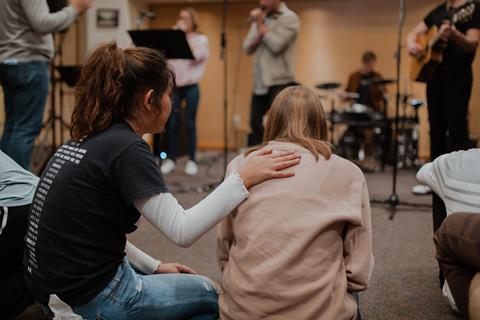Sexual violence is very prevalent in the UK today and the impact devastates the lives of those who experience it. Here, Kathryn Slatter, CEO of Lifecentre, a charity supporting victims of sexual violence, explains her hope for the futures of people who have had this life experience and how we can support survivors.

I have always felt great compassion and felt called to work with those who have experienced injustice, wanting to make their lives better. I worked for many years for the probation service and now have the great privilege of running Lifecentre. In both my work for the probation service and Lifecentre, I have worked with people who have had damaging experiences that affected their ability to engage in everyday life in a positive way. My faith, and the work that Lifecentre does, gives me a great sense of hope that people can get their lives back.
Sexual violence sadly is very common. It is hard to provide accurate estimates of the scale as most people do not report the crime. Most studies estimate that somewhere in the region of one in four women and one in six men, have had some form of unwanted sexual experience.
We only have to look in the news to see high profile incidents of sexual violence with the murder of Sarah Everard and Sabina Nessa in 2021. Website Everyone’s Invited, an online place for survivors to share their stories, highlighted the prevalence of the issues students in schools face with harassment and unwanted sexual experience.
Most studies estimate that somewhere in the region of one in four women and one in six men, have had some form of unwanted sexual experience.
In Sussex, according to recent police figures, every day six women or girls are raped or sexually abused, and this does not include people of other genders and people who did not report the crime. This means we probably all know someone who has had an unwanted sexual experience.
Sexual violence has a profound impact on the life of the person who has experienced it. Without help many turn their feelings inward and end up using drugs, alcohol, food, or self-harm as ways of coping with the trauma. For many the course of their lives can be immeasurably impacted, leaving them vulnerable to complex physical and mental health issues, difficulties in their relationships, and becoming disengaged from education or employment, leaving them economically disadvantaged. Many never talk about their experience because they are ashamed or blame themselves, even though what happened was not their fault. Instead, they suffer in silence. Sometimes the brain’s way of protecting us is to block out the memory of the abuse. For some, they actually remember later in life, when they might reach out for support.
If you do know someone who has experienced sexual violence, you may be wondering how you can best support them. We all worry what the right response is; what to say, what not to say. The best thing you can do is be as supportive and non-judgemental as possible. It is therefore important that you reassure people that you believe them. Simply saying “I believe you, it must have taken a lot of courage to tell me about this” will be really validating of their experience. Also reassure them that what happened to them was not their fault. Saying things like – “I am here for you, I am sorry this happened, this should not have happened to you”, will help free that person from a sense of guilt and shame.
Simply saying “I believe you, it must have taken a lot of courage to tell me about this” will be really validating of their experience.
If you have experienced sexual violence, your story is unique, your story was not chosen but you needn’t face it alone. There is support available for those who have experienced sexual violence. Lifecentre walks beside people on a journey of transformation, giving them the support they need to light up the possibilities for a brighter future. People who access our therapy say it is life saving and life changing. People overcome addictions, feel safer, and experience improvements in their mental health, coping better with flashbacks, that throw them back into the trauma, and feel a reduced need to self-harm. There is hope.
Lifecentre provides therapy and helpline support for survivors, as well as other support available through our website here.































No comments yet